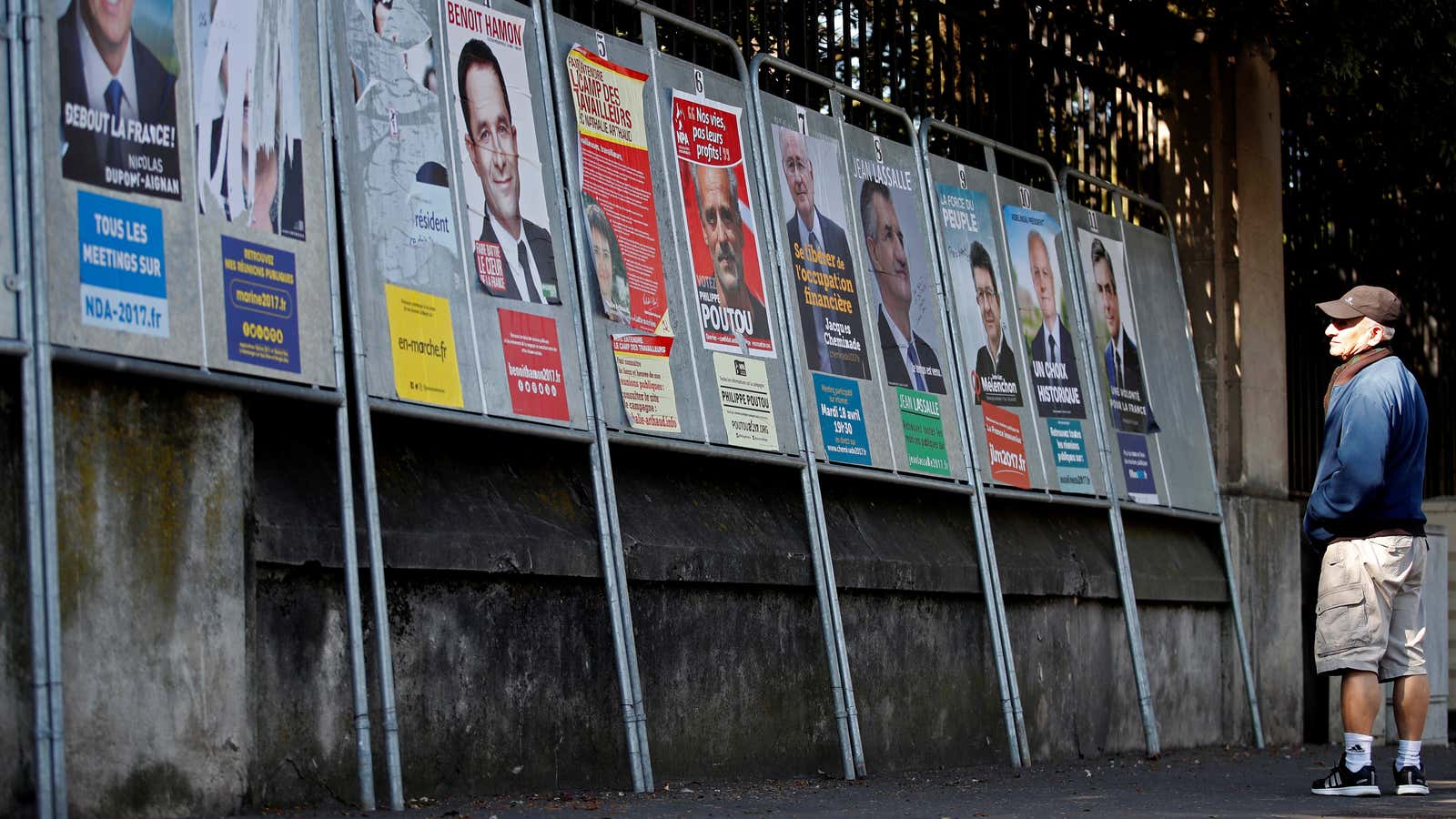France’s presidential election is too close to call.
With a day left until the polls open, a quarter of voters say they are still undecided. According to polls, any of four candidates, from the far left to the far right, could attract around 20% of the vote in tomorrow’s first round. The top two will go into a run-off second round on May 7.
The following charts highlight the defining issues of this election, from sluggish economic growth to growing discontent with globalization. The candidates have proposed a number of solutions to the country’s enduring problems, from a 100% tax on the rich to suspending all immigration. The policies that resonate most with voters will push two candidates one step closer to the presidency, and could radically alter France’s place in Europe, and the world.
Youth unemployment
French president François Hollande swept into power on a promise to “invert the curve” (paywall) of rising unemployment. Despite pushing through a series of controversial labor reforms, youth unemployment has remained stubbornly high since the financial crisis. Around a quarter of French young people are now unemployed—up from 18% in 2008. While this is much better in France than Italy or Spain, it’s three times higher than in Germany and nearly double the UK.
Far-right leader Marine Le Pen has seized on this as a rallying cry. With opportunities dwindling, France’s youth have responded by turning to Le Pen in droves. Throughout the campaign, she’s enjoyed support from almost 40% of voters aged 18-24.
Voter apathy
France historically boasts high turnout during presidential elections, with 80% of voters heading to the polls in 2012. But the electoral apathy that delivered the White House to Donald Trump may be on the way to France. Over 30% of French voters have told pollsters they plan to abstain from the first round. This historic level of apathy could propel Le Pen into the second round, as her ardent supporters will likely turn out, while the other candidates could see their tepid, disgruntled supporters stay home. (A terror attack in Paris just days before the vote may also give voters there pause, hurting the candidates who rely on urban turnout.)
Economic growth
France had a relatively mild financial crisis in 2008, compared with the economic carnage in other big countries. Equally, it had a slow recovery in recent years. It could be worse—just look at Spain and Italy—but lagging behind Germany and the UK rankles. France’s sluggish economic growth has fed rising opposition to the euro, the EU, and international trade in general, which Le Pen has cited as culprits for the country’s ills. Out of the 11 presidential candidates, only centrist Emmanuel Macron has remained a staunch defender of globalization throughout the election campaign.
Immigration
France’s foreign-born population is not unusually high or low compared with other big European countries. But between 2008 and 2016, the number of asylum-seeker applications rose dramatically, from just under 42,000 to 83,000 a year. In Paris, where a large number of migrants congregate, the mayor opened the city’s first official refugee camp last year to cope with “unprecedented migration.” Makeshifts camps have cropped up across the country, most notably in the northern city of Calais, where a sprawling refugee encampment dubbed “the Jungle” once sheltered 6,000 migrants before it was forcibly dismantled, scattering vulnerable migrants elsewhere in the country.
The country’s high-profile refugee crisis has fueled anti-immigrant sentiment, which has largely benefited Le Pen (paywall), and to a lesser extent center-right challenger François Fillon.
The rise of the far right
Since taking reins of the National Front in 2011 from her father, Le Pen rebranded the party to attract more women and appeal to young voters. Her detoxification plan is working; once a fringe party in the French political landscape, the National Front is now a bonafide electoral force.
This has not just blurred the traditional left-right axis in France (the far-right leader happily mixes traditionally left-wing causes like women’s rights with her anti-immigration stance), but has pushed France’s traditional parties—the Republicans and, especially, the Socialists—to the periphery.
State social spending
The French enjoy some of the strongest social protections in Europe: The country’s unemployment benefits and maternity leave are far more generous than those of its neighbors. France devotes more than a third of its GDP to social spending, a higher share than almost everywhere else in Europe.
In this election, the fate of France’s generous welfare system hangs in the balance. Two of the leading candidates, Macron and Fillon, are proposing significant cuts in the name of economic liberalization, while Le Pen and far-left candidate Jean-Luc Mélenchon want to expand the role of the state even further.
